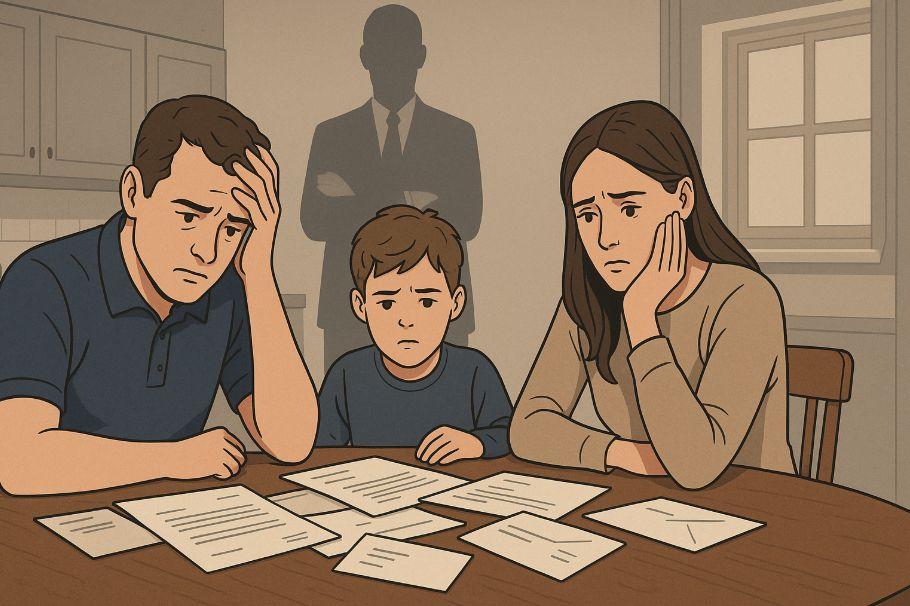The HMRC Child Benefits system is meant to support families across the UK, yet recent developments have raised serious concerns. A growing number of parents have been wrongly accused of fraud, facing unexpected repayment demands and legal threats. This blog explores how such errors occurred, why innocent families were affected, and what reforms are needed to restore trust in the system.
What Is HMRC’s Role in Managing Child Benefits?
 Her Majesty’s Revenue and Customs (HMRC) plays a central role in managing the UK’s welfare and tax systems, including the administration of Child Benefits.
Her Majesty’s Revenue and Customs (HMRC) plays a central role in managing the UK’s welfare and tax systems, including the administration of Child Benefits.
This financial support is designed to assist families with the cost of raising children. While the process might appear straightforward parents or guardians apply, and payments are made monthly the intricacies behind income thresholds and eligibility often cause confusion.
Since the introduction of the High Income Child Benefit Charge (HICBC) in 2013, individuals earning over £50,000 per year have been required to repay some or all of their Child Benefit through the tax system.
HMRC is responsible for identifying these cases and ensuring that overpayments are recovered. However, this well-intentioned oversight mechanism has, in many instances, led to innocent families being wrongfully targeted, primarily due to flawed data matching and complex household situations.
How Did the Child Benefit Fraud Scandal Unfold?
The controversy began quietly, with a growing number of families receiving letters from HMRC alleging they owed money due to overclaimed or fraudulent Child Benefit payments. Initially, many assumed these were isolated cases. But as reports emerged nationwide, it became clear that the issue was widespread.
These accusations often stemmed from system-generated compliance checks. HMRC’s digital tools flagged discrepancies based on income declarations, changes in household composition, or apparent mismatches between child benefit claims and tax records. However, many parents were caught off guard some of whom had been fully compliant, while others had never been made aware that their circumstances had changed enough to require updated declarations.
What made the situation more alarming was the scale at which these letters were being distributed and the severity of the language used in them. Parents reported receiving sudden demands for repayments totalling thousands of pounds, with limited information about the basis of the claim or how to challenge it. This led to understandable frustration and a growing distrust in HMRC’s processes.
Why Were Innocent Parents Accused of Child Benefit Fraud?
Several factors contributed to innocent individuals being wrongly implicated. In many cases, families had either misunderstood or not been informed about the need to file a Self-Assessment tax return if one parent earned above the £50,000 threshold. Others were unaware that their partner’s income even if they themselves earned below the threshold could impact their eligibility for full Child Benefit.
Administrative errors within HMRC’s systems also played a significant role. Mismatched National Insurance numbers, duplicate addresses, or outdated information resulted in incorrect assumptions about fraud. Additionally, households with changing dynamics such as newly separated parents or guardians who took over care were particularly vulnerable to being misidentified as fraudulent claimants.
The complexity of the HICBC and lack of clear communication led to situations where ordinary families were wrongly penalised, not for deceit, but due to confusion or oversight.
What Are the Common Reasons Behind HMRC Compliance Checks?
 HMRC routinely conducts compliance checks to monitor claims and ensure that taxpayers are fulfilling their obligations. In the case of Child Benefit, these checks are usually triggered when reported income levels seem inconsistent with benefit claims, or when there is a suspected failure to declare changes in circumstances.
HMRC routinely conducts compliance checks to monitor claims and ensure that taxpayers are fulfilling their obligations. In the case of Child Benefit, these checks are usually triggered when reported income levels seem inconsistent with benefit claims, or when there is a suspected failure to declare changes in circumstances.
While such oversight is necessary to prevent genuine fraud, the reliance on automated triggers and algorithm-based assessments often fails to consider real-life nuances. For example, when a parent’s income fluctuates due to freelance or contract work, they may unintentionally fall foul of HICBC rules even without fraudulent intent. Similarly, errors in previously submitted returns or delays in HMRC processing can lead to inaccurate assessments.
These processes, while designed to uphold accountability, have increasingly been criticised for lacking flexibility and clarity, especially for families unfamiliar with the finer points of tax legislation.
How Does the High Income Child Benefit Charge (HICBC) Affect Families?
The introduction of the HICBC significantly changed how Child Benefits are handled for higher-income families. Anyone earning over £50,000 who continues to receive Child Benefit must repay a portion or in some cases all of the benefit through additional income tax. The more an individual earns beyond that threshold, the greater the repayment required, with full repayment expected once income reaches £60,000.
While this policy was introduced to ensure fairness and reduce unnecessary public spending, many families were unaware of its implications. In particular, individuals who were not the primary recipients of the benefit but earned above the threshold were still held responsible for repayment. This has led to complex financial situations, especially in blended families or those with inconsistent income streams.
Unfortunately, HMRC’s communication about the HICBC has often been insufficient, leading to unintentional non-compliance and subsequent accusations of fraud. Families have found themselves in difficult positions required to repay years’ worth of benefits they didn’t know they weren’t fully entitled to.
What Happens When Parents Receive HMRC Fraud Letters?
Receiving a letter from HMRC alleging fraud can be deeply unsettling. These communications are often formal, urgent, and light on specific details. Many parents report that the letters simply outline that they owe money, with no clear explanation of the alleged offence or a breakdown of the calculation.
Moreover, the tone of these letters often gives the impression that guilt has already been established, rather than inviting clarification or dialogue. In some cases, letters have included repayment deadlines, threats of penalties, or legal action, all without giving families the opportunity to respond or clarify their situation first.
This approach undermines trust and leaves many feeling as though they are being treated as criminals, rather than customers who may have made an honest mistake or been victims of a data error.
How Can Parents Appeal HMRC Child Benefit Fraud Accusations?
 Despite the daunting nature of the process, there are avenues for parents to dispute or appeal HMRC’s decisions. The first step is to request a Mandatory Reconsideration, during which HMRC reviews the case based on any new information provided. If this reconsideration does not resolve the matter, parents can escalate it by submitting an appeal to an independent tax tribunal.
Despite the daunting nature of the process, there are avenues for parents to dispute or appeal HMRC’s decisions. The first step is to request a Mandatory Reconsideration, during which HMRC reviews the case based on any new information provided. If this reconsideration does not resolve the matter, parents can escalate it by submitting an appeal to an independent tax tribunal.
The process, however, is neither quick nor easy. Many parents face challenges navigating the legal and technical language used in correspondence and forms. Access to legal support or tax advisors is not always available, especially for those from low-income households. As a result, a significant number of wrongly accused families accept the charges simply to avoid further stress or prolonged uncertainty.
This points to a system that, while offering the right to appeal in theory, does not make it practically accessible for many.
What Are the Legal Rights of Parents in HMRC Investigations?
UK law provides all individuals with the right to challenge decisions made by government bodies, including HMRC. Parents who feel they have been wrongly accused of fraud or overpayment have the right to ask for detailed records, clarification, and access to all data held on them under the General Data Protection Regulation (GDPR).
They also have the right to seek independent legal advice, to be treated fairly under the law, and to contest any decisions they believe were made in error. If HMRC has acted unreasonably or without providing sufficient evidence, parents may even be able to make formal complaints or claims for compensation.
How Can Overpayments and Penalties Be Resolved?
When HMRC demands repayment of overpaid Child Benefits, parents often feel they have no choice but to comply. However, there are solutions. In cases where the overpayment resulted from a genuine misunderstanding or HMRC’s own error, families can apply for leniency or request that penalties be waived.
Parents facing financial hardship can request payment plans or enter a “Time to Pay” arrangement, allowing them to clear the debt over a more manageable timeline. Crucially, parents should always ask for a full breakdown of how the amount owed was calculated before making any payments.
What Can Be Done to Reform the HMRC Child Benefit System?
 The HMRC Child Benefit system is in clear need of reform. The complexity of the HICBC, coupled with poor communication and reliance on automated checks, has made the system difficult to navigate for many families. Reforms could include simplifying the income assessment process, offering clearer explanations of responsibilities when a claim is made, and introducing a warning system before accusations or repayments are issued.
The HMRC Child Benefit system is in clear need of reform. The complexity of the HICBC, coupled with poor communication and reliance on automated checks, has made the system difficult to navigate for many families. Reforms could include simplifying the income assessment process, offering clearer explanations of responsibilities when a claim is made, and introducing a warning system before accusations or repayments are issued.
Furthermore, better training for staff, more transparent correspondence, and improved access to human advisers would reduce the number of false accusations and ensure that the system supports families rather than penalises them.
Why Is Transparency Important in HMRC’s Fraud Investigations?
Transparency is the cornerstone of trust between government institutions and the public. When families understand why they are being investigated, what evidence is being used, and how they can respond, they are more likely to engage positively with the process.
Currently, many parents feel blindsided by HMRC’s actions, receiving sudden accusations without explanation. Clearer, more compassionate communication would not only reduce stress but also increase compliance and co-operation.
How Can Parents Protect Themselves Against Future HMRC Errors?
Parents can reduce the risk of future issues by keeping thorough records of all Child Benefit claims, tax returns, and correspondence with HMRC. They should also monitor changes in household income and update HMRC as needed particularly if income approaches or exceeds £50,000.
Using HMRC’s online services to review current benefit status and tax records regularly is also advisable. When in doubt, parents should seek advice from a qualified tax professional to ensure they’re meeting all obligations correctly.
Conclusion
The HMRC Child Benefit fraud scandal has exposed serious flaws in the system, from unclear rules and poor communication to an over-reliance on automated compliance checks. While the goal of preventing misuse is valid, it must be balanced with fairness, empathy, and transparency.
Innocent families should not bear the cost of systemic inefficiencies. Going forward, HMRC must prioritise reform, ensuring that support reaches those who need it, without subjecting them to undue stress or false accusations.
FAQs About HMRC Child Benefits and Fraud Investigations
What does the HICBC mean for parents in the UK?
It means that higher earners must repay part or all of their Child Benefit through income tax, which can catch some parents unaware if not clearly communicated.
Who is responsible for paying the HICBC in a household?
The person with the higher income, even if they are not the one receiving the Child Benefit, is legally responsible for repaying it.
Can a parent be falsely accused of Child Benefit fraud?
Yes. Due to system errors or misreported information, some parents have been wrongly accused and required to appeal.
What options are available if I disagree with HMRC’s decision?
You can request a reconsideration, appeal to a tribunal, or seek independent legal advice to challenge the decision.
How far back can HMRC demand Child Benefit repayments?
Typically, they can go back up to four years, but in more serious cases, demands can stretch much further.
Are support services available for accused parents?
Yes. Citizens Advice and tax professionals can help guide you through the appeals and repayment process.
How can I avoid falling into HMRC compliance issues?
Stay informed about income thresholds, keep accurate records, update your details promptly, and seek advice if uncertain.








